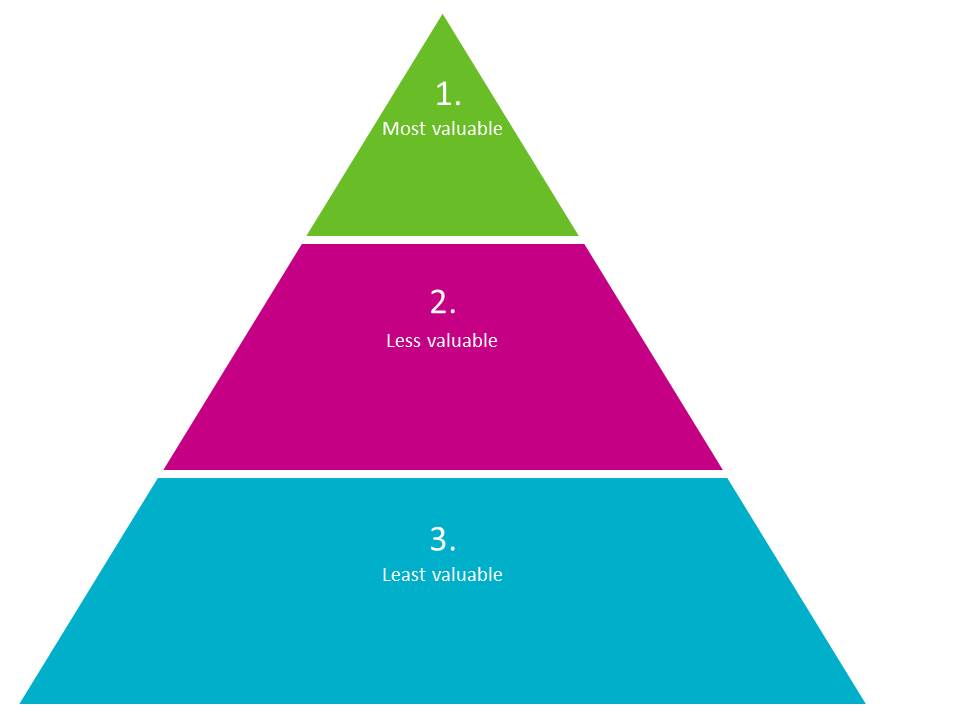The real value of low value search terms
When planning a paid search campaign, most PPC Managers will think of their keyword structure a bit like the below. You want to focus your budget on the most valuable keywords, the ones most likely to generate your conversions, i.e. sales, leads, enquiries etc. And this is completely understandable – paid search is a quick, reactive platform that can generate almost instant results.
The danger, though, is in viewing non-converting search terms as ‘not valuable’. If you’re benchmarking ‘value’ as a direct, immediate action taken on your website, what about all the search queries that either aren’t converting as much, or even at all?
Let’s put that in perspective by taking the diagram above and look at how it could work for people searching for Maternity Clothes.
“Oh no! Search queries containing ‘reviews’ and ‘size guide’ are losing us money?! Block them immediately and never speak about them again!”
Okay, so that’s a bit overblown, but sometimes it’s dangerously close to the truth of what happens. Non-converting search terms are blocked and things move on. But what if you stopped for a moment and considered these non-converting terms?
“Maternity Clothes Reviews”
Does your site have product or brand reviews? Do you have a review strategy with the correct mark-up in place from your SEO team or agency? If you had a good number of positive reviews on popular third-party platforms like TrustPilot or Feefo then these would automatically start showing on your paid search and product listing (Shopping) ads. They’d potentially answer the query before a user has clicked, not only saving you money, but also helping to advance a customer to the next stage in their journey without needing to click first.
“Maternity Clothes Size Guide”
Does this content exist on the site? If it did you could have saved yourself the cost of these clicks and instead hooked these users in once they’re closer to purchase point. Do your competitors have size guides? If so, you’ve likely lost these users to another brand. Sorry about that.
Let’s say you share this data with your SEO and Content teams. They implement a review strategy and create some cracking size guide content on the site.
The result six months down the line? You’ve increased organic traffic for some highly relevant customers, engaged them with your brand and brought them into your sales funnel. Oh, and your PPC Return on Ad Spend (ROAS) has gone through the roof.
They’re not looking quite as ‘less valuable’ now, are they?
Say goodbye to silos
This is why integration and communication between teams is so important. The customer journey is fluid and ever-changing – between platforms, channels, times and devices. So your marketing activity needs to reflect this, with your paid search strategy feeding into and off of other disciplines such as content, SEO and social.
The more integrated your approach, the more targeted, intelligent, and relevant your campaigns will be.
I get it, it’s often not that easy – your Paid Media and SEO teams probably aren’t in the same part of the office, or more likely not even in the same business with inter-agency work becoming more and more the norm – but this is exactly why setting up these simple processes across your teams is so important.
The superpower of the Search Query Report
Something as simple as sharing the results of your Search Query Report (SQRs) with another team can add massive long-term value to your entire marketing strategy. Whilst compiling these reports may be the bane of many a PPC Manager’s life (it’s a tedious process of elimination that often lasts for hours on end), they allow you to see exactly what’s going on with your chosen keywords across your campaign.
This is where Broad Match and Phrase Match keywords come in. You might find search queries from these keywords that aren’t generating conversions, or are less relevant than you would like. But it’s important to remember that less relevant is not the same as irrelevant.
Broad Match – similar or related keywords to the ones typed by the user. So your ad will show to those searching not only for ‘maternity clothes’, but also ‘plus size maternity jeans, ‘black maternity dress’, ‘pregnancy clothes’, etc.
Phrase Match – exact or close variations of the phrase typed by the user. So your ad will be shown to those searching for ‘maternity clothes’ as well as ‘maternity clothes sale’, ‘cheap maternity clothes’, etc.
Exact Match – exact phrase that’s typed by the user. Your ad will only be shown to those searching for ‘maternity clothes’, and no other related terms.
The longer you spend digging through the search queries that have triggered your broad and phrase-match adverts, the more you start to build a more holistic picture of the keywords and topics around your campaign. That means you get closer to understanding the entire customer journey through all of their touchpoints – and once you have this knowledge, the world really is your oyster.
If you know what your customers want – and not just what you want them to want – what they’re looking for, how they’re searching, behaviours they exhibit, you can tailor your marketing efforts to meet their needs exactly.
No more fingers in the air.
This is why at Fresh Egg all teams work with the customer journey first and foremost in their minds, because nothing happens in isolation. If you would like to find out more about our approach, then get in touch.

